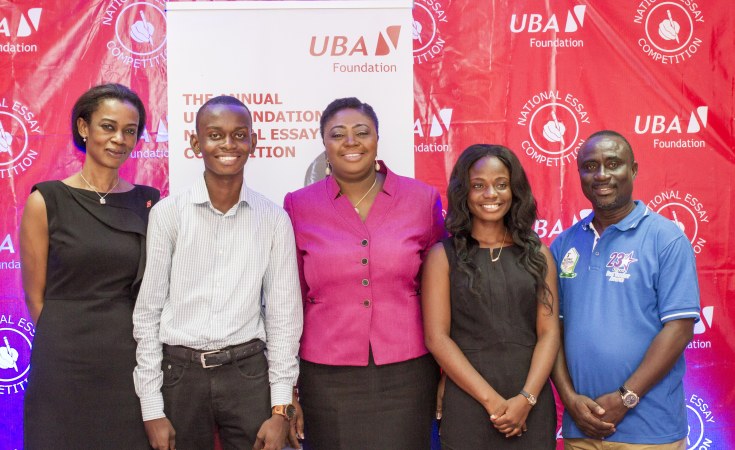UBA Foundation, the corporate social responsibility arm of the United Bank for Africa Plc, is calling on all Senior High School students in Ghana to participate in the 2017 edition of the National Essay Competition (NEC). Launched in 2014 in Ghana, the competition provides a competitive platform to develop the intellectual and writing abilities of Senior High School students in across Africa.
At a colourful ceremony at UBA's Ghana’s head office, the launch was attended by a number of UBA’s senior executives, staff and representatives from the Ghana Education Service and beneficiaries from previous editions.
The Chief Executive Officer of UBA Ghana, Abiola Bawuah was pleased with the bank’s contribution to education in the country so far. “For three consecutive years, we have organised and sponsored nine students at the tertiary level, and this year we are hoping to make it 12. We are committed to this and will keep supporting students who strive to achieve academic excellence in cognitive writing among other academic disciplines” she said.
She added that, “the number of essay entries received last year was an improvement over the previous years and we are encouraged by this. The UBA Foundation National Essay Competition is amongst the top academic competitions in the country at the moment. We have guardians and students who call in to ask when the competition is starting. It tells from the outside how keen the competition is getting and also reminds us of how we cannot fail the people”
The CEO of the UBA Foundation, Bola Atta talked about the contribution of the Foundation to the first nine beneficiaries of the NEC in Ghana who are currently at various institutions in Ghana receiving quality education. Of the competition, she said, “there is no looking back on this. One of our key focus areas is Education as it leads to empowerment especially for the youths who are the future leaders on the continent. We have launched in 3 African countries presently and plan on extending this to all countries in which we operate. I’d like to wish all the hopefuls success with their entries as this is a potentially life changing competition for many’.
Mr. Augustus Owusu-Agyemfra, the Deputy Director of the Secondary Division of the Ghana Education Service in his remarks praised UBA for their contribution to education and pledged their support to sensitise all Senior High Schools of the UBA Foundation Essay Competition. “I have heard of the competition and I have learnt of its contribution. We will use our connection with all the schools to ensure this year’s competition is well promoted”.
In her testimonial, Ms Dorcas Darko, a previous winner who is in her third year at the University of Ghana shared her experience with the guests. “UBA has been very instrumental in my education. For me it was like a test to myself. In the least did I know I would emerge among the top three. My parents didn’t have to stress to raise my school fees because UBA had it covered. Am grateful to the organization and especially the UBA Foundation. I would like to encourage everyone who qualifies to participate in the competition. UBA are really true to their words”
Master Frederick Asante, also a previous winner, recounted his moments. “To me it was very challenging. I learnt a lot through participating in the UBA Foundation Essay Competition. It broadened my horizon and tested my cognitive skills. I would like to thank the Foundation for their support and like to entreat high school students take it serious this time”
The students stand the chance of winning educational grants to help their tuition in any African University of their choice. The National Essay Competition in Ghana has produced nine winners, some of whom are studying in various universities in Ghana.
Entries for the fourth edition start on Thursday, October 5 and will close on Friday, November 10. Applicants are required to submit handwritten essays of not more than 750 words to any UBA Ghana branch or to the head office, Heritage Tower in Accra, on the topic: “Galamsey or illegal mining has been a menace to the Ghanaian society causing ill effects. As a student, what ways or methods do you suggest can curb this societal problem?”,


